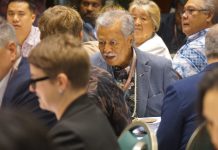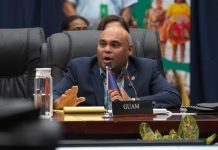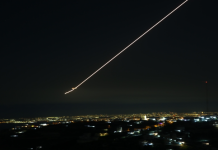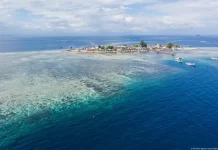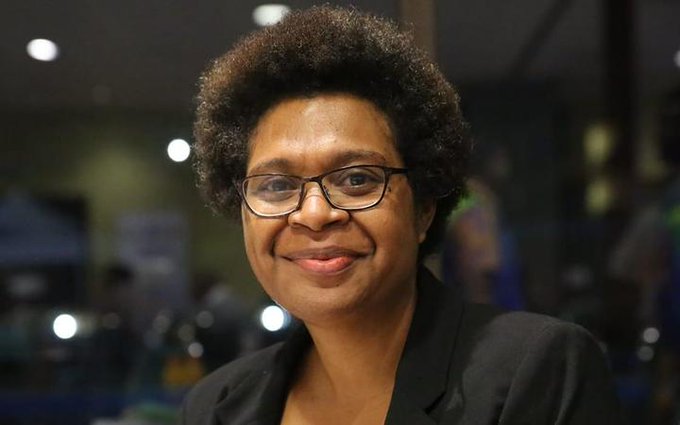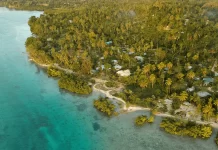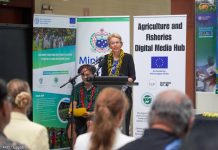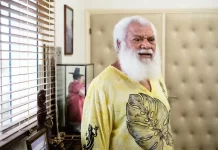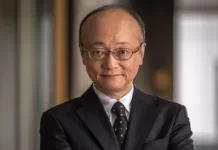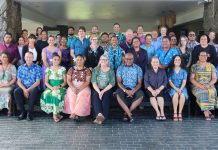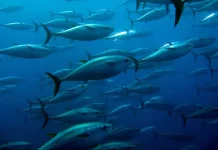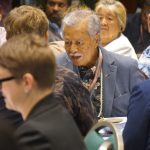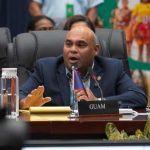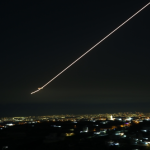The COVID-19 pandemic has posed many challenges in our sea of islands, but it has also presented us the opportunity to build on our strengths-which lie very much in our kinship and relational ties as well as our ability to live off our land and sea. If anything, the pandemic has highlighted our need to continue to reflect on our dependence on imported goods, especially food and how we can live a more healthy and sustainable life. For example, research in Fiji and Solomon Islands showed that there was a reinvigoration of local food systems and local food production as well as the re-emergence of cultural safety networks and values such as the barter system.
Ensuring that our Blue Pacific is protected as much as possible from the COVID-19 pandemic, and future crises, has meant that governments have had to divert much needed resources to ensuring that systems and protocols are in place to support our frontline workers, however it has also become clear that in the effort to protect our borders and people from COVID-19, other important aspects of service delivery such as health and education have been affected. In a region that is prone to natural disaster and threats of climate change, there is a need to keep building resilience not only around the COVID-19 but the ongoing challenges of climate change and natural disasters.
In 2020 the Forum Economic Ministers approved the broad terms of reference for a socio-economic impact assessment of COVID-19 on our Pacific communities. The Secretariat over the past year compiled a report which will provide the basis for advice to our Forum leaders and Pacific governments on our continued COVID-19 response. This includes health and wellbeing: integrated pathways for economic recovery and resilience: adaptive learning and employment pathways, inclusive social protection systems and sustainable livelihoods and food systems.
There are many concerns around the impact on our Pacific economies, especially because many of our island countries are tourism dependent. Border closures have not only affected big business but also individuals and families through loss of income, this along with lockdown measures have no doubt caused anxiety and stress for many across our region. Coupled with the work from home measures and in countries like Fiji where children have been at home as well, the burden of care for children and the vulnerable such as those with disabilities and the elderly will most likely fall on women. Lockdowns, loss of income and uncertainty around many things including vaccine hesitancy has also led to mental health concerns and the need for adequate services and the strain on health systems and health workers. Early stigma associated with COVID-19 was also a concern in Papua New Guinea.
One of the greatest concerns relating to COVID-19 has been the increase in gender based violence. In Papua New Guinea the 1 Talk Kaunselling help line, increased its call hours and capacity in anticipation of an increase in calls. The toll-free national helpline in Fiji recorded a 300 percent increase1 in domestic violence-related calls one month after curfews and lockdowns were implemented. In April 202O, there were 527 recorded calls, compared with 87 and 187 calls in February and March respectively2. In Samoa, during the first six weeks of lockdown, Samoa Victim Support Group responded to 415 calls through the helpline, with 46 distress calls resulting in police intervention to stop domestic violence in the home.
Women’s groups have linked the increase in domestic violence to the rise in unemployment and financial difficulties which have resulted from the pandemic. While family violence or violence between intimate partners is the most common form of violence reported, other forms of gender based violence such as rape and sexual harassment remain a cause for concern.
Gender Based Violence in my view is one of or if not the most important obstacle to not only reducing inequality between men and women but building sustainable, resilient communities. During this time of living through the COVID-19 pandemic it is important to keep in mind that emotional violence and forms of coercive control also are equally important forms of violence. While we do know that violence against women in our region is the most prevalent form of gender based violence, we also recognise that marginalised groups including persons with disabilities and LGBTQI also suffer from violence.
In order to progress gender equality, it is essential we view gender as being about both men and women and the role of leadership in supporting equality for all. It is important that Pacific Women have leadership roles in all spheres of life. The lack of women’s leadership at the highest political level also contributes to slowing down progress. It is very pleasing to see that Samoa has elected its first female Prime Minister and Solomon Islands has elected three women to Parliament. This is a sign of progress however, there are three countries in the region, which includes my own Papua New Guinea who have no women at the highest level of political representation. The importance of women’s voices for diversity and inclusion cannot be understated, and especially during these trying times.
Efforts to address gender inequality in the region has a long history with Pacific Feminists and women’s rights activists leading the response in terms of advocacy and service provision, but we still have a long way to go in addressing gender inequality and particularly gender based violence.
While we recognise the challenges, and struggles I think we need to acknowledge that there has been gains in terms of legislation and policy. For example, most countries have domestic violence legislation and many countries have made great progress with establishing referral pathways. Some promising examples include the Solomon Islands and Kiribati SafeNet referral system. It has also been pleasing to see cross Pacific knowledge exchange such as the SafeNet study tours from FSM and Kiribati to Solomon Islands and the continued support and mentorship of the Fiji Women’s Crises Centre to neighbouring Pacific Island countries.
Specific policies to address and mainstream gender is also evident in a number of Pacific countries, Vanuatu being the latest to launch its National Gender Equality Policy last month. Regional commitments such as the Pacific Platform for Action on Gender Equality and Women’s Human Rights 2018-2030 and the Pacific Leaders Gender Equality Declaration provide the guiding framework for advancing the gender agenda in the region.
For many years Donor and Development partners have supported the work of civil society and governments to address gender inequality. The EU funded Pacific Partnership on Ending Violence against women and girls with the support of the governments of Australia and New Zealand enables the Pacific Island Forum Secretariat, the Pacific Community and UN Women Pacific to work jointly under a common framework to address gender equality and ending violence against women and girls. Each partner is responsible for one intervention area as defined by the three programme outcomes:
• Outcome 1 (Secretariat of the Pacific Community – SPC): Enhance Pacific Youth’s formal in-school and informal education on gender equality and prevention of VAWG. This is important for achieving transformational change.
• Outcome 2 (UN Women): Promote gender-equitable social norms at individual and community level to prevent VAWG and ensure survivors have access to quality response services; and
• Outcome 3. The Pacific Islands Forum Secretariat –PIFS is to empower national and regional CSOs to advocate, monitor and report on regional and on government commitments to enhance gender equality and end VAWG.
This is an important component of gender work in the region, because as I have mentioned previously, the work to address gender inequality in the Pacific has been led by civil society and grass roots activism. It is important that national and regional CSO’s have the right skills to advocate and monitor gender commitments in the region so to actively engage and participate in dialogue with governments. Engaging with a wide range of CSO’s and faith based organisations will enable conversations and advocacy to reach beyond traditional activist groups. Involving men and boys and young people is also key.
As the Australian government’s flagship gender investment Pacific Women Shaping Pacific Development gender inequality comes to the end, there are many positive outcomes for ending violence against women and girls and women’s empowerment however it is important that we continue to build on this effort and institutionalize and take greater ownership of successful and promising initiatives. We can only do this if there is leadership and commitment from our Pacific governments.
In 2021, the Pacific Islands Forum Secretariat has commissioned the review of the Pacific Leaders Gender Equality Declaration to determine the effectiveness and relevance of the Declaration as well as to gauge views from member countries and relevant partners on ways to better coordinate regional gender commitments.
By way of background the leaders of the Pacific announced the Pacific Leaders Gender Equality Declaration (PLGED) at the 43rd Pacific Islands Forum in Rarotonga in 2012, as a result of the concerns Pacific Leaders had that overall progress in the region towards gender equality was slow. The PLGED renewed commitment to lifting the status of women in the Pacific and empowering them to be active participants in economic, political, and social life.
To progress these commitments, Leaders committed to implement specific national policy actions to progress gender equality in the areas of gender responsive government programs and policies, decision making, economic empowerment, ending violence against women, and health and education.
This review could not have come at a better time, a time where we have high levels of violence against women and girls, limited opportunities for women’s economic advancement and some of the lowest levels of women’s political participation in the world.
The review is also timely and complements current work around the 2050 strategy for the Blue Pacific Continent which encompasses much of what I have talked about today.
The trying times that we find ourselves in requires us to rethink about how we live in this world but there are some elements of our lives which require continued conversation. Gender Inequality continues to be an area of concern in a region and a conversation we must continue to have at all spaces whether it be in academic conferences like this, in policy spaces or within our homes and communities.
The above text informed a keynote address from Dr Fiona Hukula, Pacific Islands Forum Gender Specialist, and was delivered as part of the ANU annual Pacific Update 2021 series, on 22-23 September, 2021. Dr Hukula is a leading researcher on Gender Based Violence and prior to her new appointment, was with the PNG Research Institute where she held the position of Senior Research Fellow, Programme Leader, Building Safer Communities Programme Gender PNG.
The focus of her research included sorcery accusation related violence, reviewing PNG Justice policy, and the mechanisms for developing safe towns, and cities. She was responsible for representing the institute internationally on gender, law and justice, human rights, and social development issues.
As the Forum’s Gender Specialist, Dr Hukula works closely with Non-State Actors around the Pacific Region to build capacity and developing, tracking,monitoring, and improving policies relating to gender equality. She will be working to support stronger partnerships with key agencies, and support and promotion of regional political leadership towards gender equality and ending violence against women. She holds a Doctor of Philosophy in Social Anthropology from the University of St Andrews, a Master of Arts in International Criminology from the University of Sheffield in the United Kingdom, a Graduate Diploma Social Science from the University of PNG, and a Bachelor of Arts in Anthropology from Victoria University in New Zealand.
SOURCE: PIFS/PACNEWS


